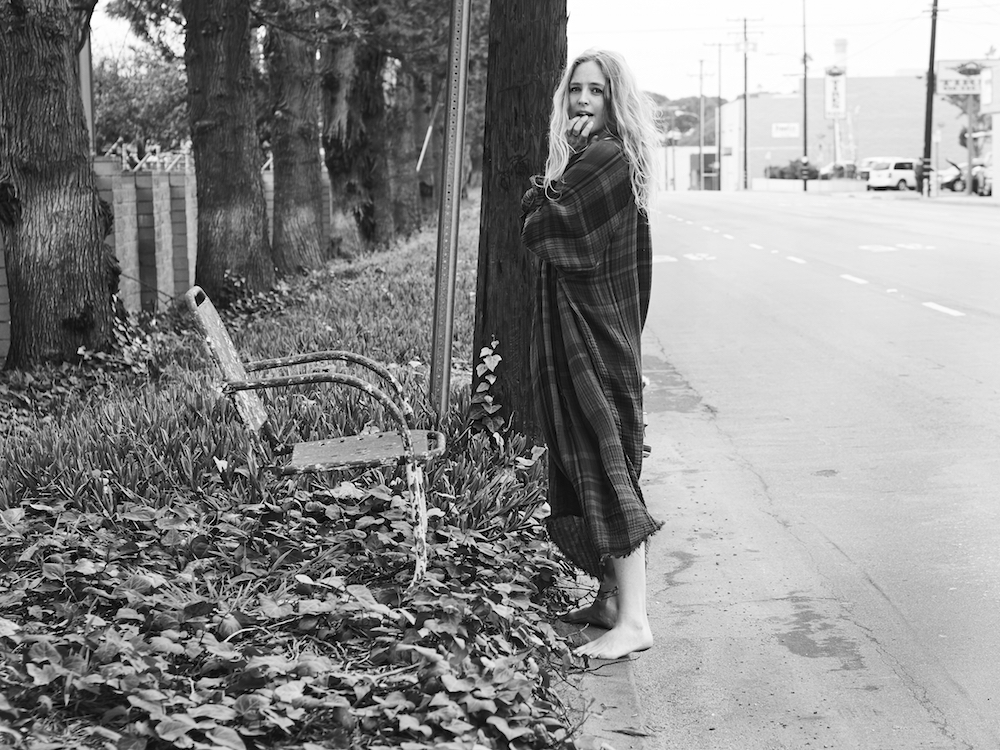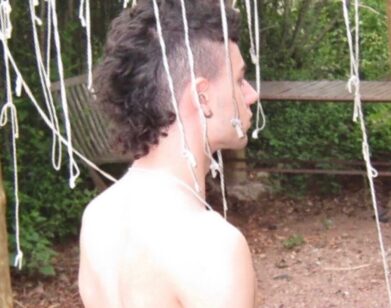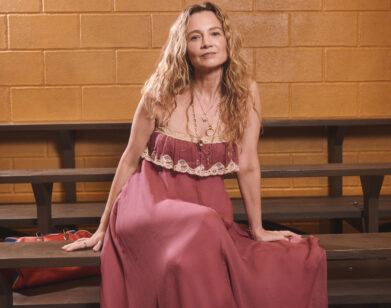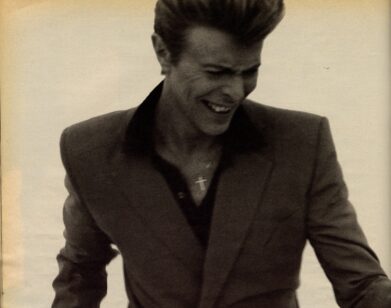Lissie’s Midwest Move
LISSIE IN LOS ANGELES, JANUARY 2016. PHOTOS: DANI BRUBAKER. STYLING: JUSTIN KENNEDY. HAIR: GUI SCHOEDLER AT EXCLUSIVE ARTISTS MANAGEMENT USING ORIBE HAIR CARE. MAKEUP: JEN FIAMENGO AT WALTER SCHUPFER MANAGEMENT USING CHANEL.
“I’m proud of this album. It’s very personal,” singer/songwriter Lissie says of her third LP My Wild West. “It’s a lot less about boys and heartache, and a lot more about my own inner thought processes and how to have a bold but good life.”
Out last week, My Wild West marks a stark change in not only Lissie’s musical output, but also her personal life. Take, for example, “Hollywood,” the second song on album: Delicate piano and strings layer beneath soft and slow vocals that foreshadow her move from California to a 40-acre farm in northeast Iowa (“Maybe it’s time that I was leaving / I got a long way to go / I’m through with all that make believing”). For the last 12 years, Lissie lived in L.A. and the northwest mountain valley of Ojai, and was signed with Columbia Records in the U.K. She released chart-topping songs and worked with producers like Bill Reynolds of Band of Horses. In 2014, however, she dropped her labels and became independent. When beginning to write her first independent album at the start of 2015, she felt “stuck,” gave up on “making it,” and decided it was time for a change of scenery. Shortly thereafter, songs began to flow and My Wild West was born.
“I look back on old songs of mine, like on my first album, and I’m talking about this choir of bees. Another song on my first album talks about how I’ve dreamt of this field of corn,” the now 33-year-old says. “It’s like I’ve been writing about this stuff for eight years and I didn’t even know, like I’ve had this inner awareness and subconscious desire.”
Lissie released Catching a Tiger in 2010 via Columbia, followed by 2013’s Back to Forever via Columbia and Fat Possum Records. My Wild Wild West returns to her roots as a singer/songwriter, while simultaneously leaving the door open for future growth and exploration. As she explains, “This decision gave me relaxation-slash-confidence and a little bit of ambivalence—to be able to just go and make a record, I don’t care if anyone likes it. I’m doing it for me.”
Just before she left for her European tour, we spoke with Lissie over the phone about moving and her mild Midwest.
EMILY MCDERMOTT: It’s a little unclear from the album’s description, so I want to ask, did you write this album before you moved or some before and after?
LISSIE: I had written some songs in the beginning of 2015 and the plan was to make a record. As I started to make it, I was thinking, “I’m just doing this because I feel like this is what I’m supposed to be doing.” It was probably all in my head, but I felt this pressure from the outside. I don’t think anyone was meaning to pressure me; I think I was just ready for a change and felt like I couldn’t make one because I was afraid of some fallout that didn’t exist.
So I decided not to make an album and then decided to move, but I wanted to finish some songs before I left. I was like, “I’m not going to make an album. I’m just going to finish a couple of songs with my friend, this great producer Curt Schneider.” It freed me up and I felt very liberated once I knew I could do whatever I wanted. We were having such a fun time in the studio, and started recording more songs and more songs. About halfway through, I was like, “Oh man, I guess I’ve got an album now.” [laughs] So it happened in a really weird, kind of reverse psychology [way] of just being myself. When I did move, in June, I was able to leave feeling like I had documented my California years, reflected, and done a proper goodbye through the process of making the album.
MCDERMOTT: I know the farm you bought is about three hours north of where you grew up, but why did you want to move so close to home? Why Iowa?
LISSIE: When I was young, I used to canoe in this town in northeastern Iowa and it was always a place my heart felt good in. In my 20s, my mom and I went and saw the bridges of Madison County, which are in Iowa, and I had seen that movie with Clint Eastwood and Meryl Streep. I’ve always done these Iowa road trips. I did this transcendental meditation course in Fairfield, Iowa. So I’ve known since my early 20s that someday I would buy a farm in Iowa. Because of this longing for change and freedom I was feeling, this light bulb went off, like “Let’s get this farm in Iowa going.” So I flew to Minneapolis, drove to this super small town in northeast Iowa, looked at properties, found a 10-acre farm—and I’ve since bought another 37 acres—and it was all very rapid. My gut’s telling me, “This is your next step, this is what you need to do.” You need to get out of your comfort zone, return to the Midwest, see some family, and, as cheesy as it sounds, work the land—plant some trees, maybe take up watercolors, I don’t know. [laughs]
MCDERMOTT: Have you done any of that?
LISSIE: Not yet, but on New Year’s Eve I did some watercolors with my nieces. Theirs were better than mine. I’ve got a far way to go. Rather than focusing on growing my career, I’m like, “How can I maintain my career, so I can take a month off and keep bees and have a garden?” Or, “Take a year off and take some classes at the local college?” I started dreaming about these choices. Now, I’m busier than ever and I don’t have time for anything, but moving to Iowa was this idea that I have choice, I have freedom, and I’m brave. I’m strong and I can do things that scare me. I can drive in the snow even though it terrifies me. I’m doing it all alone, I don’t have a boyfriend, it was like, “I can do this.”
MCDERMOTT: Did you know anybody aside from family? I imagine moving to a new place by yourself would’ve been a bit terrifying…
LISSIE: I have my family and it’s really easy to meet people. The girl who helped me with my loan at the bank has become one of my really close girlfriends. She invited me to join a kickball team, so every Wednesday that I was around over the summer it was kickball night. There’s trivia night and all these cute little restaurants and coffee shops. Iowans are super talkative, like me. I’m very talkative. I’m very curious about strangers.
MCDERMOTT: Yeah, I’m from the Midwest too. No one is afraid to talk to each other.
LISSIE: Yeah, it’s almost like nosiness, but it’s harmless. People have been so helpful. The guy I bought my property from is still around, so he’ll come by. He put a fence up for me. When my driveway’s snowed in, the contractor will call, like “Hey, you have to call Darren, he’s got to plow the driveway.” [laughs] It’s fun. It’s like being in Gilmore Girls sort of.
MCDERMOTT: There are obviously upsides of everyone being friendly and willing to help, but having lived in California and L.A. for 12 years, what were some of the struggles you faced when readjusting to a slower lifestyle?
LISSIE: I haven’t really settled in yet because my house is under construction and I’ve been touring nonstop, but I left the Midwest feeling like, “People are small-minded, they don’t want to ask questions, they don’t want to think out of the box.” Some of that was true. Politically, and in terms of being open-minded and having discussions and being cultured—not to sound snooty—there was a time where I felt like there wasn’t a lot going on around here. Now that I’ve come back, the area I moved to, they went for Bernie Sanders. I didn’t get to the caucus because it snowed so much, but even where I grew up, there’s so much happening. I think more and more interesting and open-minded people are staying in the Midwest and not fleeing for the coasts. So I was worried everybody was going to be super conservative and racist—I don’t want to get into an argument at the bar with some old racist homophobic person—but it’s not like that at all.
MCDERMOTT: Those are legitimate concerns, though, because that is a huge stereotype associated with Middle America.
LISSIE: And it can be true, but the more you get into conversations with people, you find out they’ve been brainwashed by the news and they don’t actually know any better. Then you don’t hold it against them and can continue to have conversations and gently change their mind… Or not.
MCDERMOTT: Moving to the album, the lines in “Hero” really struck me, when you’re singing about everything you “could’ve been.” Do you frequently look backward thinking about what you could’ve done had you stayed in California or stayed with a label?
LISSIE: There was a time in my late teens and early 20s where I was motivated by this wanting to get out, to prove to the world that I had something to offer—that kind of youthful spirit, where maybe I had my eye on fame and fortune. I mellowed out in my late 20s and now that I’m in my early 30s, I’m coming to peace with it. My priorities have really changed. I’ll always want to play and share my music with as many people as I can, but the emphasis is more on how do I find a happy place, what’s my balance, what’s my ideal? Sometimes people think, “You don’t get to have it all, you don’t get to be happy, life’s a struggle,” but what if it’s not?
I was toying with the idea of ambivalence a lot. It’s something I work on, not being so invested in outcomes and being more engaged in the process of my life. “Hero” is about knowing what you want to see happen, but being somewhat ambivalent and not being caught up in outcomes, because it’s really almost the same thing, it’s all someone’s opinion. Whether I’m a hero or a zero doesn’t really matter. It’s all perception.
MCDERMOTT: You said you wanted to find your ideal. Do you know what that looks like yet?
LISSIE: For a long time I wanted to be special and to stick out amongst the crowd. Something I yearn for now is to be one of many. Because I can isolate and be a bit of a loner, [my ideal] is finding some sense of community where I’m one of many and where my skills are equally as important and valuable. Also, coming to peace with getting out of the game—it doesn’t matter if I chart or if I’m on the MTV Video Music Awards. It’s finding a sense of community, hopefully finding a good relationship when I slow down, being in nature, being outdoors. I want to be a beekeeper, I want to plant all these wildflowers, I have all these plans for my land. [My ideal] is being able to be outdoors, have a labor intensive life, and then have this other life, where I hop on a plane and go sing to people in Norway.
I use the example of Norway, [because] I do well there. They’re low key, down to earth people. We’ve established this bond over the years because it’s just about the music, the sharing, the songs, and the voice. It’s not about a lot of other crap. But in saying that, more radio stations have added this album in the States than ever before. So the minute I was trying to back out, things actually kind of took off more. It’s ironic… I’m about to go [to Europe] for a month. Hopefully I’ll make more fans, get people interested in the album, and come home with a little bit of money so I can build a deck. It’s finding that balance between hustling now and saving your money.
MCDERMOTT: You said a bit earlier that you like being comfortable, but that moving was stepping out of your comfort zone. What keeps you motivated and helps you face these fears?
LISSIE: There are things I’m interested in learning more about, like keeping bees, having a pickup truck, being on these back roads, and being by myself on this land. I want to push myself to be brave and out of my comfort zone, but I guess I stay in my comfort zone knowing I have my family close by. I’m very much a homebody so once I have my home set up how I want it, that’s my zen, my comfy little nest where I drink my wine and watch my Netflix.
MCDERMOTT: What are you watching?
LISSIE: I keep re-watching Friends. It’s so dumb. There’s so much good TV and I’m really into all of it, I just finished watching Fargo, but I just keep re-watching Friends because it’s so comfortable and cozy. You feel like you’ve known them your whole life. It’s a contradiction because I like my comfort zone but I get curious about living this lifestyle that’s a little more rugged. It’s this balance between seeing what I’m capable of, while also making sure I’m close enough to my support system. I’m really close to my family. As I get older, it’s like they’re the only people I really talk to.
MCDERMOTT: Is your family what helps keep you grounded?
LISSIE: Yeah, I think so. We’ll get together and not even be in the same room of the house, but it’s nice knowing they’re there. My sister came to see me, I was packing, and she was like, “I’ll go upstairs so you can pack.” I was like, “Okay, it’s nice knowing you’re upstairs though.”
MCDERMOTT: Growing up, did you appreciate being in a more rural area? I hated it when I was younger. I didn’t appreciate it until I moved away.
LISSIE: I think I appreciated it. I’m 33, my generation, when I was young, we’d go out into the woods for the entire day and come back for dinner. I was definitely a kid of the ’80s, who was out and about. I lived in a small city on the Mississippi River across from Iowa, so I didn’t have a country upbringing, but in high school we would go drink kegs in cornfields—you know, try to party on the fly. I had a pickup truck and I listened to country music. I appreciated it, but I also had a lot of weird authority figure experiences. I got kicked out of high school and that was the straw that broke the camel’s back. I was just like, “Fuck this place. I’m getting out of here.” I thought people were small minded and judgmental.
So I appreciated it because I liked the childhood I was afforded; everyone kind of knew each other and you could just go ride your bike all day. But once I was in L.A., I was definitely dazzled by that for a while. I think I always appreciated it; I just didn’t think the opportunities were here for me.
MCDERMOTT: As one last question, is there a song on the album that you feel really encapsulates the shift you’re going through?
LISSIE: “Ojai,” the last track on the album, because it is getting back to how I started. It signifies an ending, but it’s also open-ended enough to signify a beginning at the same time. It seems like a perfect way to end the California chapter. It’s just guitar and vocals, which is how I began my career. I won’t do just guitar/vocal stuff moving forward, but knowing there’s not someone on my case, like, “You can’t do that because it’ll never get on the radio!” It doesn’t matter [anymore] because I’m just trying to sing about my life. “Ojai” good, it’s more of a comma than a period.
MY WILD WEST IS OUT NOW. FOR MORE ON LISSIE, VISIT HER WEBSITE.







